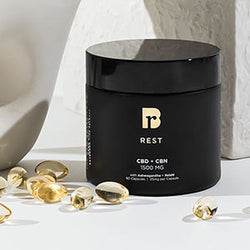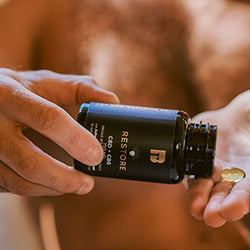When choosing supplements, the form they come in can be just as important as the ingredients they contain. Among the most popular forms are softgels or capsules, and gummies. While gummies may appeal due to their sweet flavor, the inclusion of sugar or sugar alternatives in gummies introduces potential downsides. In contrast, softgels and capsules, especially those free from sugar, artificial sweeteners, and colors, offer a cleaner, healthier option.
The Allure of Gummies—and Their Trade-offs
Gummy supplements have gained popularity in recent years due to their convenience, flavor, and ease of consumption, especially for those who struggle to swallow pills or prefer those with a sweet tooth. However, while gummies can make taking daily vitamins more enjoyable, they often come with a hidden cost: sugar, sugar alternatives, dyes and other harmful additives.
-
Hidden Sugars in Gummies: Many gummy supplements contain added sugars to enhance their flavor. This can range from a few grams to even more, depending on the brand. While this may not seem significant, consuming these supplements daily can contribute to an unnecessary intake of sugar, which has been linked to various health risks. Excessive sugar consumption is associated with increased risks of obesity, type 2 diabetes, and cardiovascular disease. According to Harvard Medical School, sugar can lead to inflammation, weight gain, and even higher risk of heart disease .
-
Sugar Alternatives: Not Much Better: To cater to health-conscious consumers, some gummy brands swap sugar for sugar alcohols or artificial sweeteners like sorbitol or aspartame. However, these alternatives can come with their own side effects, including digestive discomfort, bloating, and a laxative effect in some individuals. Studies have shown that sugar alcohols such as sorbitol and xylitol can lead to gastrointestinal distress, especially when consumed in large amounts . Furthermore, artificial sweeteners have been linked to metabolic disruptions and increased cravings for sugary foods, which may contribute to weight gain over time .
While gummies provide a tasty solution to supplement consumption, their reliance on sugars or sweeteners compromises their overall health benefits. The sweetness that makes gummies palatable often comes with hidden trade-offs.
Why Softgels and Capsules Are the Superior Choice
-
No Added Sugars or Sweeteners: Softgels and capsules stand out because they contain no sugars or artificial sweeteners. This makes them a healthier option for those looking to avoid added sugars or substances that may negatively affect their metabolism and overall health. Whether you’re managing your weight, maintaining blood sugar levels, or simply aiming to minimize your intake of artificial ingredients, softgels provide a clean solution.
-
Clean and Potent Formulation: Capsules and softgels often contain fewer unnecessary ingredients. They are typically composed of the supplement’s active ingredient along with essential stabilizers to preserve the formula. This allows for a more potent delivery of nutrients without the need for flavor enhancers, dyes, or fillers . In contrast, gummies must incorporate flavorings, colorings, and texturizing agents to achieve their appealing look and taste.
-
Fewer Additives for Digestive Health: Since softgels and capsules lack the sugars and sugar alcohols found in gummies, they are gentler on the digestive system. Sugar alcohols like sorbitol, commonly found in sugar-free gummies, can cause bloating, diarrhea, and stomach discomfort, especially when consumed in large amounts . Softgels bypass these digestive concerns, providing a seamless and straightforward way to support your health.
-
Consistency in Dosage: Gummies are more prone to inconsistencies in nutrient dosage. Due to their soft, chewable nature, some nutrients may degrade faster in gummies compared to the more stable environment of capsules and softgels. Additionally, the manufacturing process for gummies may result in uneven nutrient distribution, leading to variations in each dose . Softgels, on the other hand, offer more reliable dosage control, ensuring that you get the intended amount of nutrients in each serving.
The Dangers of Excess Sugar in Supplements
It’s no secret that sugar can have detrimental effects on health. Regularly consuming high levels of sugar has been linked to a host of health issues, including:
- Weight gain and obesity: Sugary foods and beverages contribute to excess calorie intake, which can lead to weight gain and obesity .
- Increased risk of heart disease: Studies have shown that high sugar intake is associated with a greater risk of heart disease, as it can increase inflammation, raise blood pressure, and lead to unhealthy cholesterol levels .
- Type 2 diabetes: Consistently consuming large amounts of sugar over time can contribute to insulin resistance, increasing the risk of developing type 2 diabetes .
Even sugar alternatives, though they avoid some of the dangers of traditional sugars, aren’t always a perfect substitute. Research suggests that some artificial sweeteners may disrupt metabolism, influence weight gain, and alter gut microbiota, contributing to poor digestive health .
Efficacy of Softgels vs. Gummies
Several studies suggest that softgels and capsules are more effective than gummies in delivering consistent doses of nutrients. Softgels offer better bioavailability, meaning that the body can absorb and utilize the nutrients more efficiently compared to gummies. This is particularly important for fat-soluble vitamins like vitamin D, E, and omega-3 fatty acids, which require a fat-based medium (such as those used in softgels) to be absorbed properly .
Additionally, softgels protect sensitive ingredients from degradation due to light, air, and moisture, making them more stable and effective over time. In contrast, gummies are more susceptible to nutrient breakdown due to exposure, which can diminish their potency .
Choosing Health Over Taste
In the end, while gummies may offer a palatable and fun way to take supplements, they come with nutritional compromises. The sugar, artificial sweeteners, and additives they contain pose risks that cannot be ignored. Softgels and capsules, especially those that prioritize clean, simple formulations, deliver nutrients without the need for these additives, making them a superior choice for those prioritizing long-term health.
While both formats have their benefits, it's clear that opting for supplements that offer zero sugar, zero artificial sweeteners, and zero unnecessary additives can help avoid the pitfalls associated with excessive sugar consumption. When it comes to health, it’s always best to prioritize nutrition over taste, and softgels and capsules provide an easy way to do just that.
References:
- Harvard Medical School. How Sugar Can Harm Your Health.
- Cleveland Clinic. Why Sugar Substitutes May Be Harmful.
- National Institutes of Health. Sugar Alcohols: What You Need to Know.
- Healthline. Sugar vs. Artificial Sweeteners: Which Is Worse for Your Health?.
- PubMed. Sugar Alcohols and Digestive Issues.
- Journal of Nutritional Science. Efficacy of Fat-Soluble Vitamins in Softgels.







